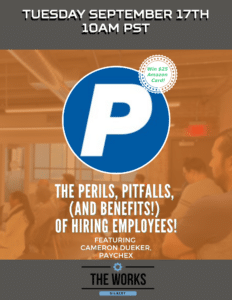Coworking vs Shared Workspaces, are they the same thing?
In the past decade (and even more so in the COVID years), the way people work has undergone a significant transformation. Traditional office setups have taken a backseat as innovative workspace solutions have gained popularity. Among these alternatives, coworking spaces and shared workspaces have emerged as prominent options for professionals seeking flexibility, community, and collaboration. While the two terms are often used interchangeably, it’s important to understand the nuances that set Coworking vs Shared Workspaces apart.
Coworking spaces, like The Works – Gilbert, are vibrant communities designed for individuals and businesses from various industries to work under one roof. These spaces typically offer a range of amenities, like coffee, drinking water, printing, scanning, and other services (like mail service and Virtual Offices) to enhance productivity and foster collaboration.
In contrast, shared workspaces refer to shared office environments where individuals or companies occupy a common space but may not share the same level of interaction or community.
Key differences between Coworking vs Shared Workspaces
- Community and Collaboration: One of the defining characteristics of coworking spaces is the strong emphasis on community. Coworking operators curate diverse communities by bringing together professionals from different backgrounds, fostering connections, and encouraging collaboration. Members often engage in networking events, workshops, and social activities.
Shared workspaces, on the other hand, may focus more on providing functional work environments without the same level of community building. - Flexibility and Scalability: When considering Coworking vs Shared Workspaces there are differentiators involving scalability. What happens when a small company experiences quick growth? Coworking spaces are renowned for their flexibility and can often offer the growing company more space without forcing them to leave for a larger home. They offer various membership options, from day passes, 5-day passes, to monthly plans, allowing individuals to choose what suits their needs best. This flexibility extends to workspace arrangements, as coworking spaces often provide hot desks, dedicated desks, and private offices (even Day Offices where you can have an office for a few hours, a whole day, a multiple days), catering to different work styles.
Shared workspaces, while also offering flexibility, may have more limited options when it comes to workspace configurations. - Amenities and Services: Both coworking spaces and shared workspaces provide amenities and services to support professionals in their work. Coworking spaces often go above and beyond, offering features like high-speed internet, meeting rooms, event spaces, printing, scanning, communal kitchens with plenty of coffee, and even on-site gyms in some instances. The focus is on creating an all-inclusive environment where members can access everything they need to be productive.
Shared workspaces may offer a similar range of amenities but may have fewer additional services compared to coworking spaces. - Cost and Pricing Structures: When it comes to pricing, coworking spaces and shared workspaces differ in their approaches. Coworking spaces, such as The Works – Gilbert, typically have a monthly membership-based model, where individuals or businesses pay a monthly fee or purchase day passes for single day access. The cost of a coworking membership varies based on factors such as location, amenities, access to parking, and level of access. Shared workspaces, on the other hand, may operate on a more traditional lease or rental model, with pricing often based on the square footage of the occupied space.
- Focus and Atmosphere: Coworking spaces often cultivate an energetic and entrepreneurial atmosphere. They are known for encouraging creativity, innovation, and knowledge sharing. The diverse community and collaborative events contribute to a dynamic working environment.
Shared workspaces, while fostering a professional atmosphere, may have a more subdued ambiance focused primarily on providing functional workspaces without the same level of curated community engagement. - Target Audience: Coworking spaces attract a broad range of professionals, including freelancers, startups, small businesses, and remote workers. The emphasis on community-building makes them appealing to those seeking networking opportunities and a supportive work environment.
Shared workspaces, although they can accommodate various professionals, may be more popular among established businesses or individuals who prioritize privacy over community engagement.
Target Audiences – Coworking vs Shared Workspaces:
Coworking spaces attract a broad range of professionals, including freelancers, startups, small businesses, digital nomads, and remote workers. The emphasis on community-building makes them appealing to those seeking networking opportunities and a supportive work environment. Coworking Spaces are often viewed as the more versatile option since they’re often the turnkey option. Many coworking spaces can sign you up and have you working that same day without any long-term commitments associated with an office lease.
Shared workspaces, although they can accommodate various professionals, may be more popular among established businesses or individuals who prioritize privacy over community engagement.
Conclusion:
While both coworking spaces and shared workspaces provide flexible work environments, the differences lie in their approach to community, collaboration, pricing, and amenities. Coworking spaces create vibrant communities, foster collaboration, and offer extensive amenities, while shared workspaces focus more on functional workspaces with limited community engagement. Sometimes less is more when it comes to a shared workspace.
Looking for a place to get stuff done in Gilbert, Arizona? Let’s talk, maybe The Works is what you’re looking for in a coworking space.




